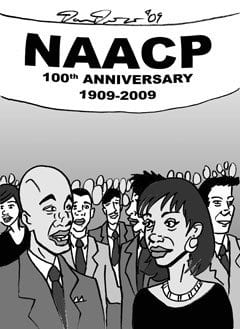
Toward a new relevance
A debilitating legacy of racial oppression is that later generations assume the attitude of victim, even though the discrimination has abated. To some extent, this sense of victimization is kept alive by those whose valiant efforts in the civil rights movement helped bring about the massive social change. The real challenge today is to motivate people to organize their lives and rise above unfortunate circumstances.
Last week, Julian Bond, chairman of the board of the National Association for the Advancement of Colored People (NAACP) and Benjamin Jealous, the organization’s president, spoke at the John F. Kennedy Library as part of the celebration of the NAACP centennial. The focus was still civil rights.
According to Jealous, the NAACP now plans to attack the disproportionate imprisonment of African Americans. Although blacks are only 14 percent of the U.S. population they are imprisoned at more than five times the rate of whites. Without question a racial disparity exists, and excessive imprisonment should be a NAACP concern.
However, the issue is how best to attack the problem. Jealous stated that upon a visit to a prison, he found that the common characteristic of the prisoners was that almost all were poor. This suggests a broader strategy based upon the treatment of the poor rather than race.
President Lyndon B. Johnson launched a war on poverty which he announced in his State of the Union address on January 8, 1964. That war has not been won. While a greater proportion of blacks than whites lives below the poverty line, there are still twice the number of whites than blacks living in poverty in America. In this economic downturn, it might be strategically more effective to reignite the war on poverty than to designate the campaign a race war.
While racial discrimination still persists in America, it is no longer the problem it was during the heyday of the NAACP. The greatest challenges now are to enable African Americans to understand the importance of building wealth and political power. Academic success is the most important element of building wealth, and massive voting in every election is essential for political power.
During the civil rights movement, blacks in the south risked death to gain the right to vote. They won, and now blacks can vote everywhere. But somehow the magnitude of what was achieved and its importance have been lost. There is no fervor to troop to the polls in every election in order to demonstrate black political power. In the recent primary in Massachusetts for a U.S. senator to replace the late Ted Kennedy, in Boston only 14 percent of voters in Ward 12 and 11.3 percent in Ward 14, the primarily black wards, bothered to show up.
Indeed there are still battles to be fought over blatant bigotry, but the biggest challenge is to encourage and motivate blacks to take advantage of those opportunities that generations of NAACP members have already created. This cannot happen unless blacks stop seeing themselves as victims.
Black Americans and others fought a battle for civil rights over many decades and they won. It is time for blacks to enjoy the full benefits of that victory and become a vigorously competitive element in American society.
The NAACP has a major role to play in the battle going forward, but it will not be maximally effective unless it adjusts its strategy to the changed social circumstances.






